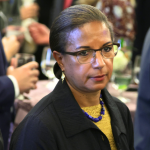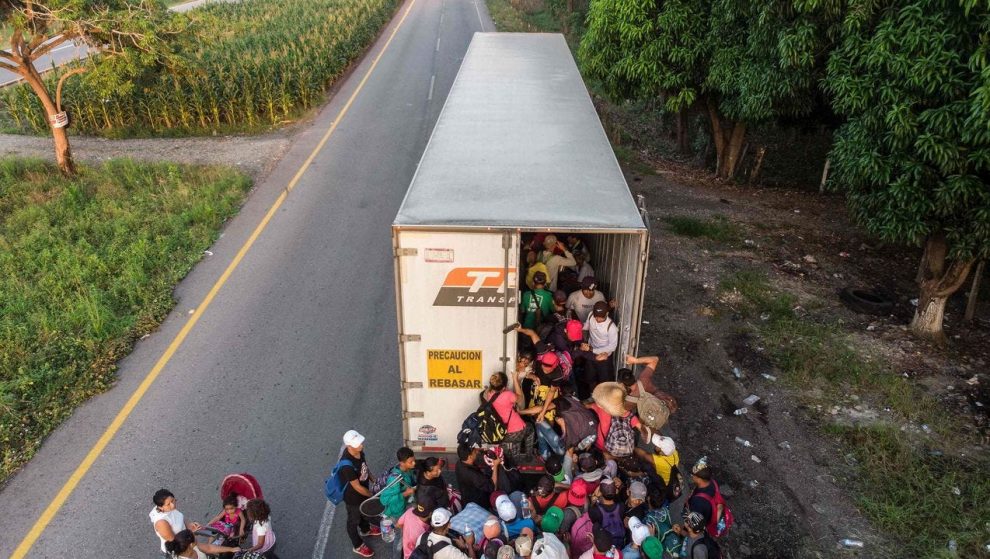U.S.-bound asylum seekers will be sent back to at least two additional Mexican border cities later this week to wait for their claims to be processed, officials said, with one of the cities in a region that is among Mexico’s most chaotic and violent.
The policy known as the Migrant Protection Protocols (MPP), or Remain in Mexico, will be implemented later this week in Nuevo Laredo in the northern state of Tamaulipas, which borders Texas, said two Mexican officials with knowledge of the matter, who declined to be identified.
Tamaulipas is home to the Gulf and Zeta cartels that include people-smuggling and kidnapping among their criminal activities.
One of the Mexican officials said the policy would also be expanded to San Luis Rio Colorado in the northern state of Sonora, which borders Arizona. Mexican newspaper Reforma reported immigration official Julio César Navarro Contreras as saying San Luis Rio Colorado was on the list.
The latest expansion follows high-stakes negotiations to fend off trade tariffs.
‘It’s hidden’: Female genital mutilation and the secret shame of Minnesota’s Somalis
Greenland rejects Trump’s hospital ship proposal, citing existing free healthcare system
USA Men’s Hockey Wins First Gold Medal Since 1980 ‘Miracle on Ice’
AOC blames critics, Trump after Munich hiccup backlash
President Trump tells Netflix to fire Susan Rice or ‘pay consequences’
Rafter vanishes in Oregon wilderness, survives five-day ordeal before helicopter rescue
Zohran Mamdani declares NYC emergency, bans all travel during blizzard threatening city
Actual Convicted Terrorist Might Hold Office in European Country He Plotted Against
Don’t Let the Media Paint the Trans Hockey Shooter as MAGA – His X Profile Shows His Politics Were Inanely Contradictory, Even Schizophrenic
Breaking: Armed Man Shot Breaking Into Mar-A-Lago Carrying Fuel Can, Shotgun
Ex-Democrat Strategist Says AOC ‘Not Ready’ For Primetime After Her World Stage ‘Fumble’
Trump Admin Sending ‘Strike Team’ to California to Root Out State’s Insurance Program Fraud
Armed man shot and killed after ‘unauthorized entry’ into Mar-a-Lago: Secret Service
‘New TARIFFS’: Trump Bounces Back with Second Global Tariff Hike Since SCOTUS Ruling
Exiled Iranian princess: Islamic regime ‘has never been this close’ to falling, people ‘begging’ Trump to help
U.S. President Donald Trump had threatened the tariffs to push Mexico to do more to stop migrants from Central America and beyond from reaching U.S. soil, after a sharp spike in numbers this year.
As part of the deal struck earlier this month to remove the tariff threat, Mexico agreed for MPP to apply to the whole length of the border, but capacity issues on both sides have slowed implementation.
Under the deal, Mexico has also deployed a new militarized National Guard police force to detain migrants near the country’s northern and southern borders.
MPP started in January and is already functioning in Mexicali and Tijuana in Baja California, which borders California, and Ciudad Juarez in Chihuahua, which borders New Mexico and Texas.
‘It’s hidden’: Female genital mutilation and the secret shame of Minnesota’s Somalis
Greenland rejects Trump’s hospital ship proposal, citing existing free healthcare system
USA Men’s Hockey Wins First Gold Medal Since 1980 ‘Miracle on Ice’
AOC blames critics, Trump after Munich hiccup backlash
President Trump tells Netflix to fire Susan Rice or ‘pay consequences’
Rafter vanishes in Oregon wilderness, survives five-day ordeal before helicopter rescue
Zohran Mamdani declares NYC emergency, bans all travel during blizzard threatening city
Actual Convicted Terrorist Might Hold Office in European Country He Plotted Against
Don’t Let the Media Paint the Trans Hockey Shooter as MAGA – His X Profile Shows His Politics Were Inanely Contradictory, Even Schizophrenic
Breaking: Armed Man Shot Breaking Into Mar-A-Lago Carrying Fuel Can, Shotgun
Ex-Democrat Strategist Says AOC ‘Not Ready’ For Primetime After Her World Stage ‘Fumble’
Trump Admin Sending ‘Strike Team’ to California to Root Out State’s Insurance Program Fraud
Armed man shot and killed after ‘unauthorized entry’ into Mar-a-Lago: Secret Service
‘New TARIFFS’: Trump Bounces Back with Second Global Tariff Hike Since SCOTUS Ruling
Exiled Iranian princess: Islamic regime ‘has never been this close’ to falling, people ‘begging’ Trump to help
Since the tariff deal, MPP has been applied to more nationalities, including Cubans, and the number of people being returned has been increased to 500 from 100 a day in Juarez.
A representative for Mexico’s national institute for migration said it had received no official confirmation for when and how the policy would be further expanded.
A U.S. Department of Homeland Security official said the department “was not in a position to confirm new locations.”
Rights groups have sued the Trump administration over the policy, which they argue leaves vulnerable people facing dangers in Mexican border towns similar to those they fled in their home countries.
In April, a federal judge in California ruled MPP likely violated U.S. immigration law. In May, however, the 9th U.S. Circuit Court of Appeals allowed the program to continue while the legal challenge proceeds.
VIOLENCE
Tamaulipas suffers from high levels of killings and kidnapping, as powerful gangs battle over drug and people-smuggling routes.
The eastern part of the state, bordering the Texas cities of McAllen and Brownsville, is the busiest crossing for families and individuals from Guatemala, Honduras and El Salvador and is also considered the most dangerous.
Nuevo Laredo, however, sees relatively low traffic of families seeking asylum, U.S. Customs and Border Protection figures show.
‘It’s hidden’: Female genital mutilation and the secret shame of Minnesota’s Somalis
Greenland rejects Trump’s hospital ship proposal, citing existing free healthcare system
USA Men’s Hockey Wins First Gold Medal Since 1980 ‘Miracle on Ice’
AOC blames critics, Trump after Munich hiccup backlash
President Trump tells Netflix to fire Susan Rice or ‘pay consequences’
Rafter vanishes in Oregon wilderness, survives five-day ordeal before helicopter rescue
Zohran Mamdani declares NYC emergency, bans all travel during blizzard threatening city
Actual Convicted Terrorist Might Hold Office in European Country He Plotted Against
Don’t Let the Media Paint the Trans Hockey Shooter as MAGA – His X Profile Shows His Politics Were Inanely Contradictory, Even Schizophrenic
Breaking: Armed Man Shot Breaking Into Mar-A-Lago Carrying Fuel Can, Shotgun
Ex-Democrat Strategist Says AOC ‘Not Ready’ For Primetime After Her World Stage ‘Fumble’
Trump Admin Sending ‘Strike Team’ to California to Root Out State’s Insurance Program Fraud
Armed man shot and killed after ‘unauthorized entry’ into Mar-a-Lago: Secret Service
‘New TARIFFS’: Trump Bounces Back with Second Global Tariff Hike Since SCOTUS Ruling
Exiled Iranian princess: Islamic regime ‘has never been this close’ to falling, people ‘begging’ Trump to help
Other officials with knowledge of the talks between Mexico and the United States say the towns of Nogales and Brownsville-Matamoros have been mentioned in discussions.
Remain in Mexico is aimed at dissuading asylum seekers from applying for refuge in the United States. The Trump administration says many claims are false, and that claimants will desist once they realize they must stay in Mexico for extended periods.
Since it was implemented, nearly 14,000 asylum seekers have been sent to Mexico under the program.
Reporting by Lizbeth Diaz in Mexico City; Additional reporting by Kristina Cooke in San Francisco, Jose Luis Cabezas in Rio Bravo and Dave Graham in Mexico City; Writing by Stefanie Eschenbacher; Editing by Frank Jack Daniel and Phil Berlowitz.
Story cited here.
























